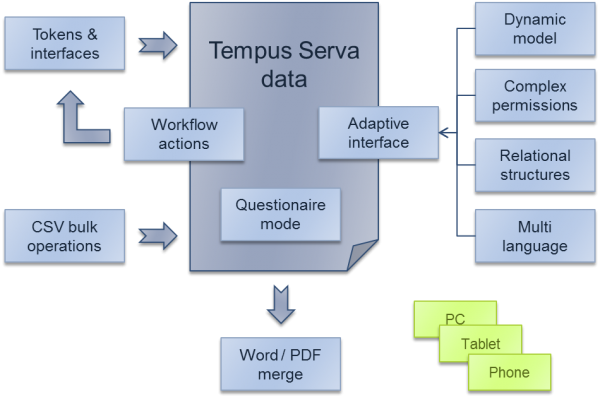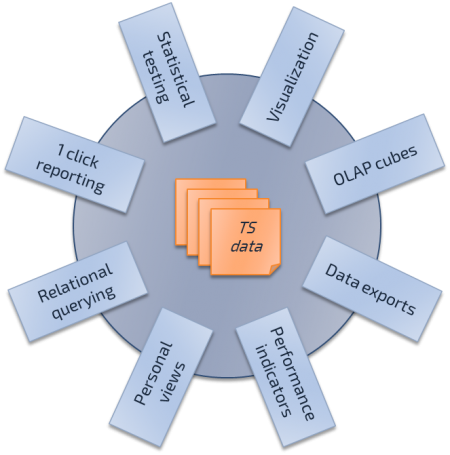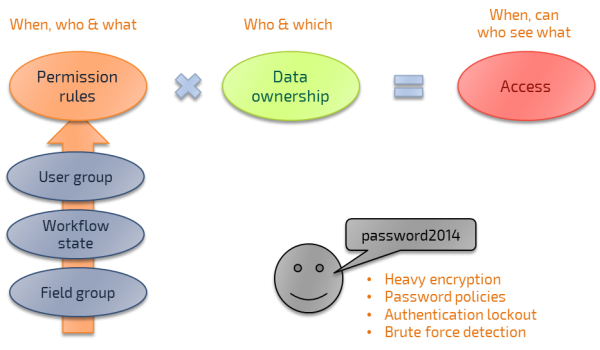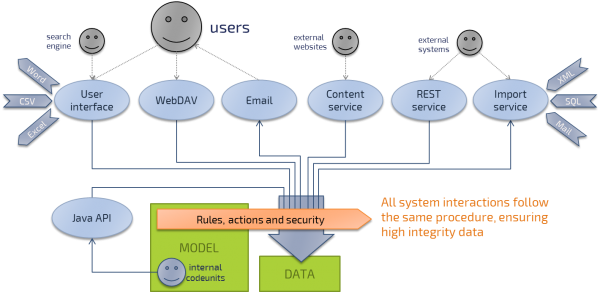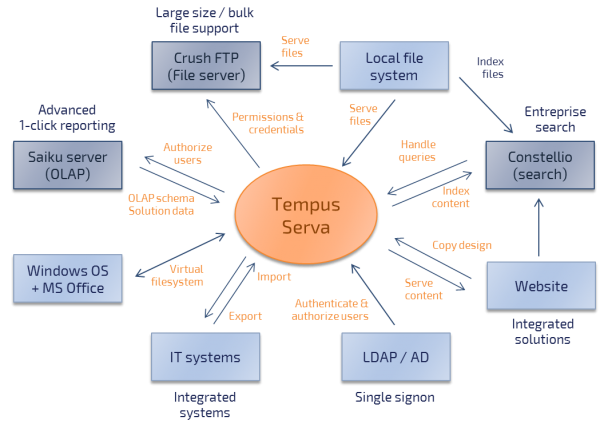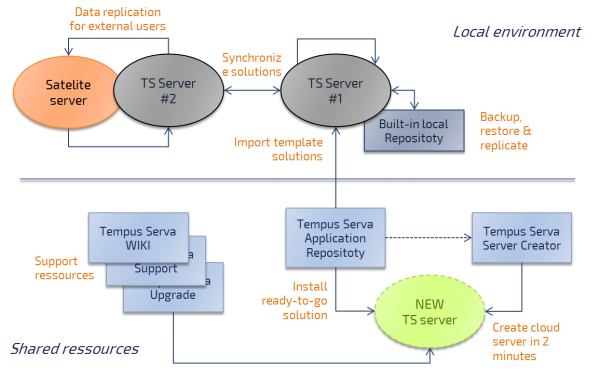Difference between revisions of "What is Tempus Serva"
old>Admin |
m (69 revisions imported) |
||
| (17 intermediate revisions by one other user not shown) | |||
| Line 6: | Line 6: | ||
[[File:SystemLifecycle.png|600px|]] | [[File:SystemLifecycle.png|600px|]] | ||
Change and improvement is a continous process. Besides reducing longterm | Change and improvement is a continous process. Besides reducing longterm TCO to almost nothing, easy rework opens for working with incremential improvement in favor of traditional waterfall development. | ||
[[File:SystemLifecycle2.png|600px|]] | [[File:SystemLifecycle2.png|600px|]] | ||
| Line 12: | Line 12: | ||
The most important feature about Tempus Serva is however the low technical skillset required to build applications. | The most important feature about Tempus Serva is however the low technical skillset required to build applications. | ||
A single day of training will enable regular office people to build new, and maintain existing systems: No more dependencies on expensive and ill-look-into-that-monday consultants. | A single day of training will enable regular office people to build new, and maintain existing systems: No more dependencies on expensive and ill-look-into-that-monday consultants. | ||
To understand the building blocks please refer to [[Structure overview]] | |||
== Feature rich platform == | == Feature rich platform == | ||
| Line 17: | Line 19: | ||
Whatever device the user is using an efficient and intuitive interface will be served. | Whatever device the user is using an efficient and intuitive interface will be served. | ||
Applications in Tempus Serva are declared and configured, and not programmed like oldschool programs. The user interface is a | Applications in Tempus Serva are declared and configured, and not programmed like oldschool programs. The user interface is a consequence of the datamodel, permissions, user language and operation mode. | ||
In Tempus Serva everything is generated on the fly, and thus individual user interfaces for different users and situations is no longer relevant. | |||
[[File:FeaturesHandling.png|600px|]] | [[File:FeaturesHandling.png|600px|]] | ||
To maximize user value from using the system, a vast array of analysis tools are available: The tools range from simple one click searches to complex statistical analysis and OLAP BI reporting. | To maximize user value from using the system, a vast array of analysis tools are available: | ||
The tools range from simple one click searches to complex statistical analysis and OLAP BI reporting. | |||
[[File:FeaturesAnalysis.png|450px|]] | [[File:FeaturesAnalysis.png|450px|]] | ||
| Line 27: | Line 32: | ||
Combined the analysis tools with the builtin document merging facilities and WebDAV Office interface, most users can carry out all their daily work from within Tempus Serva. | Combined the analysis tools with the builtin document merging facilities and WebDAV Office interface, most users can carry out all their daily work from within Tempus Serva. | ||
== | == High security environment == | ||
Security is key to designing wellfunctioning collaboration applications. | |||
In Tempus Serva you can build extremely complex permission schemes, by combining permission rules with data ownership - for example: | |||
"Operators have access to Title, Files and Deadline, but only for 'Open' and 'On hold' cases belonging to Warehouse North". | |||
"Operators have access to Title, | |||
[[File:FeaturesSecurity.png|600px|]] | [[File:FeaturesSecurity.png|600px|]] | ||
Naturally the user authentication is protected by a wide varity of protective mechanisms. | |||
== Robust entreprise architecture == | == Robust entreprise architecture == | ||
| Line 48: | Line 56: | ||
[[File:SystemLandscape.png|600px|]] | [[File:SystemLandscape.png|600px|]] | ||
Additionally Tempus Serva has a native integration of server applications that serve special or demanding needs like: Business intelligence, large file system support or entreprise search. | Additionally Tempus Serva has a native integration of server applications that serve special or demanding needs like: | ||
Business intelligence, large file system support or federated entreprise search. | |||
== Diverse ecosystem == | == Diverse ecosystem == | ||
| Line 59: | Line 69: | ||
The public Tempus Serva shared infrastructure will allow you to quickly import common applications, or even start new temporary servers to test new ideas. | The public Tempus Serva shared infrastructure will allow you to quickly import common applications, or even start new temporary servers to test new ideas. | ||
All configurations and data are normally be backed up to a remote and isolated server (see [[Cloud backup overview]]). | |||
== Thats all folks == | == Thats all folks == | ||
Latest revision as of 11:56, 10 December 2021
Quick development
Tempus Serva is a platform that lets you design and deploy customized applications, with extreme speed and reliability.
You can either create your own from scratch or reuse from the application repository.
Change and improvement is a continous process. Besides reducing longterm TCO to almost nothing, easy rework opens for working with incremential improvement in favor of traditional waterfall development.
The most important feature about Tempus Serva is however the low technical skillset required to build applications. A single day of training will enable regular office people to build new, and maintain existing systems: No more dependencies on expensive and ill-look-into-that-monday consultants.
To understand the building blocks please refer to Structure overview
Feature rich platform
Whatever device the user is using an efficient and intuitive interface will be served.
Applications in Tempus Serva are declared and configured, and not programmed like oldschool programs. The user interface is a consequence of the datamodel, permissions, user language and operation mode.
In Tempus Serva everything is generated on the fly, and thus individual user interfaces for different users and situations is no longer relevant.
To maximize user value from using the system, a vast array of analysis tools are available: The tools range from simple one click searches to complex statistical analysis and OLAP BI reporting.
Combined the analysis tools with the builtin document merging facilities and WebDAV Office interface, most users can carry out all their daily work from within Tempus Serva.
High security environment
Security is key to designing wellfunctioning collaboration applications.
In Tempus Serva you can build extremely complex permission schemes, by combining permission rules with data ownership - for example:
"Operators have access to Title, Files and Deadline, but only for 'Open' and 'On hold' cases belonging to Warehouse North".
Naturally the user authentication is protected by a wide varity of protective mechanisms.
Robust entreprise architecture
Users working directly with the webbased interface, is handled in the exact way as other systems, bulk imports or even remote applications interfacing Tempus Serva: Validation, flows, permissions all work the same, guaranteeing data integrity at all times.
As displayed the integration engine will seamlessly integrate data from other systems.
Data however is just a small component in building a fullfledged IT infrastructure. To maximize reuse and minimize custom development, the Tempus Serva platform has builtin support for common IT components.
Additionally Tempus Serva has a native integration of server applications that serve special or demanding needs like:
Business intelligence, large file system support or federated entreprise search.
Diverse ecosystem
To round up where we started Tempus Serva is built around the concept of sharing of solutions.
Applications can be backed up, restored or moved around your staging environment with minimal effort.
The public Tempus Serva shared infrastructure will allow you to quickly import common applications, or even start new temporary servers to test new ideas.
All configurations and data are normally be backed up to a remote and isolated server (see Cloud backup overview).
Thats all folks
We could write a hundred more pages about what Tempus Serva can do, but why not try it yourself yourself ?
Yes, make me a Tempus Serva server i can play around with
* No fees or any kind of liability will be put upon you by using a test server * The server is a standalone server and you cannot cause damage to other systems


